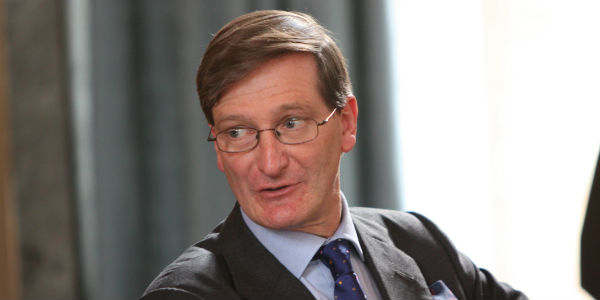Out from the shadows: the case for external oversight of UK Special Forces
While the UK government maintains a strict ‘no comment’ policy about the country’s special forces, allied countries, including the US, allow for parliamentary oversight of their covert military operations. Liam Walpole argues that the UK’s approach lacks democratic accountability and prevents proper evaluation of the military effectiveness of special forces. Options for reform include expanding the Intelligence and Security Committee’s remit to cover special forces.
 Dominic Grieve MP, Chair of the Intelligence and Security Committee. Picture: Foreign and Commonwealth Office, via a (CC BY 2.0) licence
Dominic Grieve MP, Chair of the Intelligence and Security Committee. Picture: Foreign and Commonwealth Office, via a (CC BY 2.0) licence
Lessons from America
In October 2017, four US Special Operations Forces (SOF) operatives were killed following a botched raid in Niger, West Africa. The fallout from that event left many US legislators confused as to why US special forces were in West Africa at all; what were their aims and what did they hope to achieve? Aside from claims made by Senator Lindsay Graham that he was unaware of a US military presence in West Africa – even though details on US SOF deployments are provided to Congress as part of a monthly update from the Pentagon – the Trump administration confirmed it would launch an inquiry to establish the facts.
The findings of that investigation were published two weeks ago. And although much of the 6,000-page report remains classified, an eight-page, declassified summary was also published. This detailed the mistakes that led to the ill-fated raid that left dozens of Nigeriens dead, and recommended possible safeguards to prevent the same mistakes being repeated.
Compare this to the UK government’s handling of the death of Sergeant Matt Tonroe – assumed to be an SAS soldier embedded with an American SOF Team – at the end of March 2018. While neither confirming or denying his exact role in the joint US raid in Manbij, Syria, the government retained its ‘no comment’ policy over UK Special Forces (UKSF). The UK has long employed this blanket opacity policy over the activities of its Special Forces, which precludes MPs from receiving even the most basic information about funding commitments for UKSF.
The lessons that can be drawn from these two cases are important, not only for the democratic accountability of political decisions taken by the UK executive, but also in terms of lessons learned around the effectiveness of military strategy. As Abigail Watson suggests, the Niger case demonstrates a culture where self-evaluation allows the US military and its political leaders to learn from past mistakes. And of course, the stakes are so much higher when we are talking about special forces operations, since ‘[if] detected, [it] could have a significant effect…and quite easily be the genesis of a conflict.’ However, without any form of external oversight over the activities of UKSF, important lessons may never be appropriately reviewed and incorporated into future military strategy. This represents a significant accountability gap.
Consensus grows
In December 2017, the Chair of the Intelligence and Security Committee (ISC), Dominic Grieve MP, was quoted in The Sunday Times saying, ‘in a modern democracy, having areas of state activity that are not subject to scrutiny at all by parliament is not a very good place to be.’
With this statement Grieve joined a growing coalition of senior parliamentarians concerned about the UK’s blanket opacity towards UKSF. Crispin Blunt MP, former chair of the Foreign Affairs Select Committee (FAC), and Julian Lewis MP, Chair of the Defence Select Committee (HCDC), have both raised concerns that the government’s ‘no comment’ policy represents a ‘significant accountability gap’.
But what would external oversight look like? In a policy report published by the Remote Warfare Programme (RWP) in April 2018, my colleague and I proposed reforming the ISC by expanding its mandate to include UKSF. After all, the current ISC Chair has suggested the committee holds the necessary clearances to scrutinise UKSF.
However, there are clear challenges – explored in finer detail in our report – that would have to be overcome before the ISC could take responsibility for external oversight of UKSF. For one, the ISC’s mandate has focused on scrutinising the British intelligence agencies so expanding its remit to include special forces may be perceived as encroaching on the work carried out by the HCDC.
At an event organised by RWP last month, Sir Malcolm Rifkind, former chair of the ISC (2010–14), suggested the HCDC, already responsible for scrutinising the Ministry of Defence, could scrutinise the activities of UKSF in place of the ISC. This could be done either by: 1) establishing a sub-committee represented by the most senior members of the committee, providing them with the necessary clearances; or 2) by giving all elected members of the committee security clearance – representing a new historical precedent – to hold meetings in closed and open settings. This would bring the UK more in line with our European allies, but also the US Congress where all legislators (by default) are provided with security clearance.
However, what would happen if UK parliamentarians did not pass the appropriate vetting procedures? It was mooted that vetting the first set of candidates proposed for membership of the ISC by the Labour Party leader Jeremy Corbyn resulted in delays to reconstituting the committee after the 2017 general election. The processes for providing security clearance would therefore have to be handled with the necessary diligence and sensitivity.
The additional complexities of reforming the HCDC so that it could take on the role of scrutinising special forces led us to recommend this only as a longer-term option, in recognition of the fact that it would require substantial structural, political, financial and cultural changes to the select committee system.
The ISC is therefore a sensible short-term approach to closing the accountability gap. All its members are security cleared; many hold prior experience in handling sensitive information in relevant ministerial posts; it has a proven record of handling sensitive information with propriety, and, while it could be argued this undermines the fullness of accountability, the prime minister would retain control over what the ISC can and cannot oversee.
Strategic advantages of oversight
There would be immense benefits for the UK and its special forces if parliamentary accountability was introduced. This is demonstrated by the US Armed Services Committees, where, for example, resourcing, retention of soldiers and budgeting are open to scrutiny, establishing a strategic dialogue between Capitol Hill, the Department of Defense (DOD) and the Special Operations Command (SOCOM). This relationship is not replicated between the UK Director of Special Forces (DSF), the MOD, the prime minister and parliament. By holding closed and open hearings – most recently a closed hearing on the Niger report – the US model can deliver strategic openness with tactical security, providing appropriate checks and balances on political decision-making and US SOF’s role in wider military strategy.
Many of the UK’s allies have also recognised the benefits of permitting greater flexibility over the flow of information about their special forces. Even in France, which has historically adopted a similarly opaque approach towards its own special forces, reforms in 2008 enabled French parliamentarians to question their role in overseas military operations. These two examples – Norway and Denmark are others – highlight how Britain appears to be alone among its allies in not permitting any discussion on the staffing, funding and the strategy surrounding the use of its special forces. This suggests that a balance can be struck between the need for secrecy to provide security and the need to open up government decision-making to scrutiny and debate – which is pivotal for a healthy democracy.
Undoubtedly many aspects of special forces’ activity cannot be made public but as it stands it is unclear if the necessary mechanisms exist in the UK to learn lessons if (or when) special forces operations go wrong. By downplaying the benefits of opening UKSF to external scrutiny, the UK government places itself at a strategic disadvantage that devalues lessons learned exercises that could otherwise be incorporated into improving future military effectiveness.
This post represents the views of the author, and not those of Democratic Audit.
About the author
 Liam Walpole has been Senior Advocacy Officer at Remote Warfare Programme since July 2017. Previously, Liam worked for two Conservative Members of Parliament at the House of Commons, supporting them in carrying out their duties in Parliament and their respective constituencies. Liam studied Politics and History at Brunel University and wrote his undergraduate thesis on President Barack Obama’s foreign policy in Afghanistan and the effectiveness of the then-President’s troop surge. Liam is currently studying a part-time Masters course in Diplomacy & Foreign Policy at City, University of London.
Liam Walpole has been Senior Advocacy Officer at Remote Warfare Programme since July 2017. Previously, Liam worked for two Conservative Members of Parliament at the House of Commons, supporting them in carrying out their duties in Parliament and their respective constituencies. Liam studied Politics and History at Brunel University and wrote his undergraduate thesis on President Barack Obama’s foreign policy in Afghanistan and the effectiveness of the then-President’s troop surge. Liam is currently studying a part-time Masters course in Diplomacy & Foreign Policy at City, University of London.





 Democratic Audit's core funding is provided by the Joseph Rowntree Charitable Trust. Additional funding is provided by the London School of Economics.
Democratic Audit's core funding is provided by the Joseph Rowntree Charitable Trust. Additional funding is provided by the London School of Economics.
[…] article was originally published by the Democratic Audit on June 4th […]